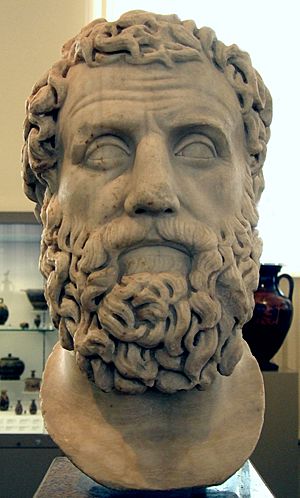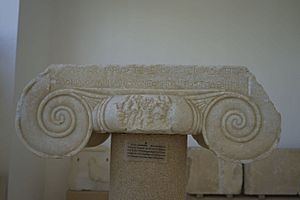Archilochus facts for kids
Quick facts for kids
Archilochus
|
|
|---|---|

Bust of a bearded man (Archilochus?). Roman copy (c. 2nd century BC) of Greek original (4th century BC)
|
|
| Native name |
Ἀρχίλοχος
|
| Born | c. 680 BC Paros |
| Died | c. 645 BC Paros |
| Occupation | Poet |
Archilochus ( Greek: Ἀρχίλοχος Arkhílokhos; c. 680 – c. 645 BC) was a Greek lyric poet of the Archaic period from the island of Paros. He is celebrated for his use of poetic meters, and is the earliest known Greek author to compose almost entirely on the theme of his own emotions and experiences.
Biography
A considerable amount of information about the life of Archilochus has come down to the modern age via his surviving work, the testimony of other authors, and inscriptions on monuments, yet it all needs to be viewed with caution.
Snippets of biographical information are provided by ancient authors such as Tatian, Proclus, Clement of Alexandria, Cicero, Aelian, Plutarch, Galen, Dio Chrysostom, and Aelius Aristides.
Archilochus was born to a notable family on Paros. Some sources suggest that his mother was a slave, named Enipo, and that Archilochus left Paros to escape poverty. However, reports of his slave background are questionable and are probably stem from a misreading of his verses. Archaeology indicates that life on Paros, which he associated with "figs and seafaring", was quite prosperous; and though he frequently refers to the rough life of a soldier, warfare was a function of the aristocracy in the archaic period and there is no indication that he fought for pay.

The trochaic verse was quoted by the Homeric scholar Heraclitus, who said that Archilochus used the image to describe war with the Thracians.
He joined the Parian colony on Thasos and battled the indigenous Thracians, expressing himself in his poems as a cynical, hard-bitten soldier fighting for a country he doesn't love ("Thasos, thrice miserable city") on behalf of a people he scorns. Later he returned to Paros and joined the fight against the neighbouring island of Naxos. A Naxian warrior named Calondas won notoriety as the man that killed him. The Naxian was punished for it by the gods: He had gone to the temple of Apollo at Delphi to consult the oracle and was rebuked with the memorable words: "You killed the servant of the Muses; depart from the temple."
Poetry
The earliest meter in extant Greek poetry was the epic hexameter of Homer. Homer did not create the epic hexameter, however, and there is evidence that other meters also predate his work. Thus, though ancient scholars credited Archilochus with the invention of elegy and iambic poetry, he probably built on a "flourishing tradition of popular song" that pre-dated Homer. His innovations however seem to have turned a popular tradition into an important literary medium.
The Alexandrian scholars included Archilochus in their canonical list of iambic poets.
Archilochus was much imitated even up to Roman times and three other distinguished poets later claimed to have thrown away their shields – Alcaeus, Anacreon and Horace.
Style
Like other archaic Greek poets, Archilochus relied heavily on Homer's example for his choice of language, particularly when using the same meter, dactylic hexameter (as for example in elegy), but even in other meters the debt is apparent.
|
θυμέ, θύμ᾽ ἀμηχάνοισι κήδεσιν κυκώμενε, |
My Soul, my Soul, all disturbed by sorrows inconsolable, |
See also
 In Spanish: Arquíloco para niños
In Spanish: Arquíloco para niños


